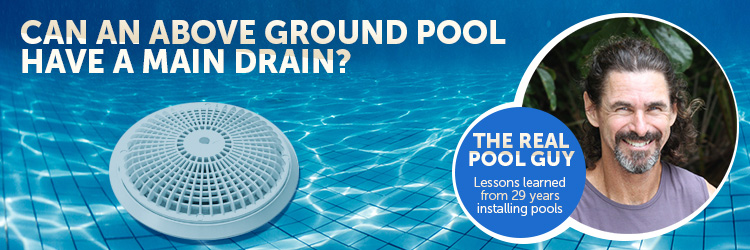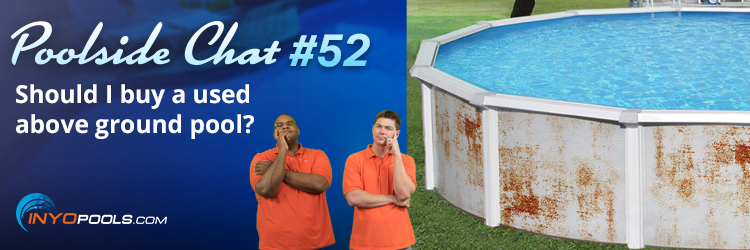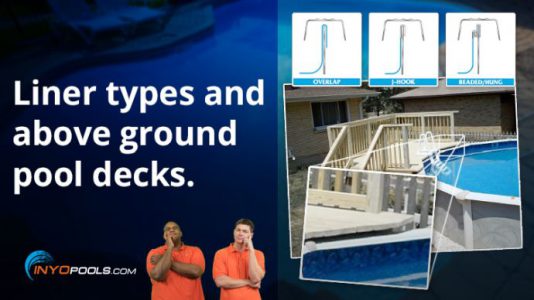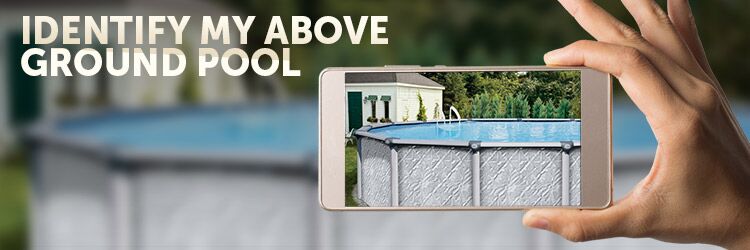Fortunately for all of us, above ground swimming pools now mostly come with decent equipment at least. What I mean by “equipment” is a pump and filter. Many years back, above grounds only came with really crappy canister sand filters and undersized pumps. They came with them to keep the cost down and who cared anyway. It was just an above ground pool. What do you expect?
Now, just about all the middle-of-the-road and higher end above grounds will have more than big enough pumps and filters and they are built to last many years. This is great, but there’s something that hasn’t changed with above ground pools and that is the skimmer and return openings in the wall. These openings are where the pump and filter hook up to the pool and they are both located high up and right next to each other.
This is not great for water circulation as the pool water is brought into the equipment by way of the skimmer box, gets filtered, and then the clean water returns to the pool through a fitting that is right next to the skimmer. So, you could have a 24’ round pool that is about four feet deep and have a great pump and filter, but it can only draw pool water in from the pool’s surface and then send it back to the pool right next to where it came from. What about the rest of the water in the pool especially the water at the bottom? How does that pool water get through the pump and filter?
With above grounds there is always the potential for all the water not to be making it evenly through the equipment and therefore causing chemical balance issues due to poor circulation. There are three ways an above ground pool can get better circulation. You could get and use an automatic pool cleaner, add a return line or two, or you could have a center bottom main drain. Out of these three options, the main drain is clearly my favorite so that is what I’m going to go over in this blog post.
Main Drains (They’re Not Just for In-grounds)
When you consider getting an above ground pool, you’ll get a few upgrades or options to choose from to make the pool better or easier to take care of. A main drain won’t be one of them as they would be hard to sell as a kit and wouldn’t be profitable enough for retailers. As a result, many who get an above ground pool and are willing to spend more for extra things never even hear about a main drain.
Everyone seems to know that all in-ground pools have main drains, but it occurs to just a few that vinyl lined above grounds can have them too. And, they are great for keeping the pool cleaner and for much better circulation. It does take more than a screwdriver and duct tape to install one, so unless you have some plumbing knowledge, you do-it-yourselfers should maybe leave installing one to the pool installer.
Installing a Main Drain
As stated above, installing a main drain in an above ground pool on your own may not be the best idea as it takes some doing. First off, a main drain requires that the liner gets cut in order for the water to travel to the filter and that’s always a scary proposition. Though, it can be done fairly easily if you know how. Installing a main drain won’t be the hardest thing you’ve ever done that you didn’t know much about, but it’s that whole “cutting-a-hole-in-the-liner” thing that is spooky. And, it should be as having a leaking pool really sucks. So, if I didn’t deter you enough and you want to attempt it, here are step-by-step instructions to help you hopefully get it right.
Materials needed:
- One main drain for vinyl pools. I say one, because they will come in packs of two as in some places, the code is to install two main drains.
- Approximately 20 feet of 1.5” schedule 40 PVC pipe.
- At least three 1.5” male threaded to slip, one 1.5” coupling, three 1.5” elbows, and one 1.5” tee PVC fitting.
- Medium PVC glue, 100% silicone, a hacksaw, a tape measure, a shovel, and a torpedo level (if you want it to look good).
- Two 1.5” PVC ball valves.
- A sharp utility blade, duct tape, and a #3 Phillips screwdriver.
I. Dig the trench
Measure in from the pool track or wall in three different places to determine the center of the pool. Example: For a 24’ round pool, measure in 12’. Mark the center and dig a trench toward the right side of where the pool skimmer is. You won’t want to dig too deep as the drain should be installed level which doesn’t allow you to bury the piping very deep.
II. Prepare the main drain
Silicone in the bottom threaded plug and silicone the threaded male to slip fitting and glue a full piece of pipe to it. Important: Duct tape the entire top opening of the main drain with the bottom gasket in place and lined up with all the screw holes. The duct tape should be one uniform layer. Doing this will completely cover the inside of the drain and its screw holes.
III. Set the main drain
Place the main drain with its attached pipe in place. Use a torpedo level and use your hands to pack the earth around it until it is firm. Use a patio block underneath it so that it has something firm to rest on.
IV. Continue with the piping
Once the main drain is set you’ll have the pipe it’s attached to in the trench you dug, but it won’t be complete. Continue plumbing by adding more of the pipe to go out of the pool’s bottom and then glue a piece upward toward the pool’s pump. Once all the piping in the trench is set and glued, go ahead and bury it. This will leave only the pipe that’s sticking up outside of the pool visible.
V. Plumb in the valve
Glue in one of the ball valves to the pipe that is now coming from your main drain. You can glue it vertically or for a nicer look, glue it horizontally. Now continue piping your line beyond the valve that you have just installed and head towards the pump.
VI. Connect the line to the pump and skimmer
You are almost done, but this is the hardest plumbing part. Locate the pool’s skimmer and plumb PVC piping from the bottom of it towards the pump and add the other ball valve to that line. You should now have two PVC lines, each with valves, heading toward the front of the pool pump. Using a “tee” fitting, connect the two lines to the pump with piping.
Try to make it look straight and nice, if you can. If you can’t, it’s no big deal. It’ll still work as long as you have glued every fitting well. Yeah, you want to make sure you glue everything properly. You can now finish installing the pool’s liner.
VII. Cutting in the main drain (Yikes!)
Now it’s time for the hard part. Just kidding. Cutting for the main drain is really easy. Stressful, but easy. Set your pool’s liner and get all the wrinkles out whatever way YouTube tells you and start filling with water. Let the pool fill at least a few inches or more. As the pool fills, you’ll start to see where the top of the main drain is at the bottom of the pool. The weight of the water will press down and the main drain’s screw holes will become visible.
ALERT: Don’t cut anything yet! When you can see the screw holes, take the main drain ring and gasket and carefully screw the ring down onto the main drain. Screw directly through the liner. There are about 10 screws so get that ring screwed down tightly all the way around.
Once the ring is firmly screwed in place, cut the liner along the inside of the ring and remove. You should now see the inside of the drain. Now you can screw down the lid and you’re done. Congratulations, you did it! The only thing left to do is pray you have glued everything right.












After blowing the line out for the winter, my above ground pool started losing water. I believe the drain cover lost it’s seal or the screws are not staying tight. Would getting a new seal and drain cover fix this or should I take the drain out?
Everybody always thinks their pool is leaking at the main drain. There is some weird human psychology that makes people think that. First off, how can the screws be getting loose? Do you live next to a giant quarry where they use Cat D-9s vibrating the earth? Maybe you have a train that goes through your yard? Get my point here? The screws can’t move. And how can it lose its seal? It either was never sealed or is still sealed. There are no dynamics that would cause the drain gaskets to suddenly start to leak. Any chance the line froze over the winter? That’s about the only thing that could cause a leak.
My 26 yr old concrete bottom “Family Fun” pool has a main drain. As part of a pool renovation, I drained the pool, removed the main drain cover, and found it filled with dirt and worms. After I vacuumed all that out, I discovered the main drain was capped from the outside (I can see the square inside of the round pvc cap). So, my guess is that this was only installed for the hydrostatic releif valve capability, and not as a functioning main drain going back to the filter (there is also no diverter valve to do so) . I have looked on-line for a solid main drain cover. I can’t seem to find one. Is there a recommended way I can cover the main drain sump so that it doesn’t fill with dirt and worms anymore? Thanks!
Also, sorry for asking an in-ground question in an above-ground forum. 🙂
I think (not sure) over the winter my main drain line broke… , i have an oval pool.. I see weird dirt formations around it.. how to know for sure and what to do in case it did? I’m freaking out … so I have to empty all the water out??
You would have to pressure test the line to know for sure and I don’t have time to explain how to do that here. You can look it up though. If the line is cracked, then it’s time to drain the pool and run a whole new line. You’ll need to get a new liner too. Don’t bother trying to save the existing one. Not worth the effort.
Is it possible to dig out the center of a pool deeper and have a main drain at the same time? I don’t know if the liner would be able to stretch enough to not leak at the drain.
Yes absolutely. I usually recommend people with bigger pools who want a deep center to get a drain too because they will be needing the added circulation the drain provides.
I am installing a 15 x 30 above ground pool and am interested in putting a a main drain in. Should I split the pool in 2 and put a drain on each side or just 1 in the middle?
Thanks for your time.
I am not a fan of two main drains. First off, it’s unnecessary and second, it’s just another hole in the liner that could leak if not installed right. Most ovals have straps that run under them so installing a main drain in the middle is not an option. I always install the main drain in the middle of the radius (curved end of the oval) at the opposite end of where the pool equipment is going. And I run the piping along the outside of the pool instead of under the straps.
Dan, what is the reason for not running the piping under the straps?
How about two drains for an inground 16 x 32‘ pool? What’s your recommendation. My pool contractor is installing one however my neighbor across the street who is a pool service guy says there needs to be two? Which one is correct?
I have had a bottom drain in my Kayak pool for many years. I always put a rubber plug in the line at the bottom of the drain and remove the fitting near the pump and allow the water to drain out of the line so when the pool water freezes it doesn’t break the line under the pool. ( ground return line is accessible because being on the side of a hill and my pump is lower than the pool bottom) Is this necessary? I am seeing where you can raise the return line up higher than the water level and just leave it freeze in the winter. Is this a safe method as I hate removing the plug when first opening the pool in the spring when the water hasn’t been treated yet.
I live in Florida so I can’t say I know much about pools in freezing winter areas. BUT, I would never be comfortable leaving water in pipes during a freezing winter. You may be able to keep the main drain line closed until the weather warms by only using the skimmer intake line for the open spring season.
I know this post above is pretty old – but: I take the center drain outlet hose off the pump (mine is flex all the way to the drain itself) and hold it up with a bungee cord. I pour non-toxic anti-freeze in it until the I can see it coming up out of that center drain. That stuff is heavier than water. That has always worked.
I have a bottom main drain on my above ground pool the valve broke off I stopped the water but do I have to drain the pool to put a new set up in
No, you don’t. Take the cover off of the main drain and plug the line going to the equipment with an expandable rubber plug. It may be hard to find the plug for purchase though.
Do you have any pictures of the plumbing of main drains with two returns? I’m more of a visual person and no one ever posts any final pics. You are one of the few that gives great detail about installation. Thanks!
We got sand in the screw holes now main drain won’t seal right. Pool is full but losing water. Any Ideas on how to fix this with out draining pool?
Do the top of the drains need to be recessed below the level of the pool edge in order to work correctly? Thanks for the help.
I replaced a liner in my pool. I put padding down before the liner. I cut drain holed placed a gasket below the padding, and about the liner. When I went to tighten down the ring one of the screws would not hold tight and the ring broke. I replaced the ring but it appears that the drain is broken. Now with my poo draining into the ground, I am left with pulling the liner off of half of the pool to replace the bottom drain. DO you have a better solution and is only one gasket about the liner necessary?
Hi Dan. We’re being given a 24′ above ground pool with a “center drain” (Not an intex pool, one sold and installed by a pool place). Is it possible to use this center drain to remove the water quicker?
I am confused about the duct tape step, do you have a picture? Also, the dual drain is to prevent entrapment by suction. The theory is that the drains are to far apart for on person to block so the suction would just redirect to the unblocked drain.
The duct tape is to keep dirt out of the screw holes during installation. If it’s hard to visualize taping the entire main drain opening with one layer of duct tape, then you can just tape over the screw holes with small pieces of tape. That’ll work fine. It’s how I used to do it in the nineties. Also, thanks for your explanation on how two main drains work for safety. It took me all the way back to the eighties, when I didn’t know that.
We have a 30’ pool with one main drain. I was told we needed to have 2 for some reason. If that is true how do you install a second? Our pool installer was horrible so I want to do this myself. We have to change the liner anyway add some more sand so now is the time. The one main worked fine just don’t understand why I have to have a second place to leak if not done right. Please help
Many years ago, the building code changed for inground pools making them install two main drains for each built body of water. Some have adopted this idea for above ground pools. I say to leave what you have alone. I think its stupid to have two drains. It’s almost a total waste of money.
The reason for two drains is because a small child can, and have, gotten suctioned to a single drain and drown. Terrible advice Dan.
Not terrible advice. Not if you know what you are talking about. A double main drain is to divert the suction in case a kid gets trapped by it from a broken drain cover. This is almost impossible in an above ground pool’s suction isn’t enough to keep a kid down.
Please allow me to give you some more potentially considered “terrible advice”. Do some research or know what you are talking about before commenting. In this case, try to find a drowning related to main drains and above ground pools. This would be a good start for a basis of an opinion.
Question…
Will an Armor Shield Liner Floor Pad affect the Main Drain? Is it still possible to maintain a good seal using floor pads or foam ??
It will not but you have the cut a hole in the liner pad around the drain before you install the liner. That way it won’t get in the way when you screw the ring on the main drain. Same goes for any foam product you use for the floor.
We have a 30ft round above ground pool about 1 and 1/2 years old. It was installed by the pool store we bought from and we had 2 drains installed which they recommended. We started losing a lot of water in our pool and couldn’t figure out why. The only thing that has stopped the loss of water was to close off the drains. No water loss since we closed them. I assume this mean we have a leak in the plumbing for the drains? I guess we will leave the drains closed off until the spring and figure out what to do then.
Hi Cheryl. Yes, I’d say you are right but you still should be losing some water as the line is only off at your equipment(valve). Make sure you are not leaking after that valve.
I have a question. We are having put in our first pool, in ground, 5 foot deep at its deepest (3 1/2 to 5 foot). It comes with two main drains but I am concerned as we will constantly be standing on them or walking over them. We chose a shallower pool so we can hang play volleyball, basketball, etc. I’m worried about stubbing toes or the annoyance of constantly walking over them. Any suggestions on this concern? The pool company said they would remove them and add an additional skimmer but didn’t recommend it for filtration reasons. Thank you in advance!!
Matt
Additional mention, we were planning to get one of those pool robots to clean the pool, if that makes a difference at all. Thanks again!
Main drains don’t usually bother people. And you are in the water so it’s highly unlikely for any toes getting stubbed. Unless you are planning on having a fast wading competition. Some times auto cleaners will get caught on main drains so that may be an issue.
You mention that a main drain will help keep the pool cleaner and provide better circulation. So does that mean I should keep both ball values open when in normal filter mode? Does it hurt the pump/filter that water is being pulled in from the bottom of the pool which may have leaves and debris and is not being pre-filtered through the skimmer basket? I guess there is a filter basket attached to the inlet side of the pump. Or, should I keep the ball value from the main drain closed, and only have the skimmer open?
You definitely keep the main drain open if you want its benefits. The pump basket will have to be cleaned more often.
We are in the process of changing out our liner in our above ground pool we removed the old one and had about a foot of water under the liner which we removed all the water by the next evening it was full of water again. What could be causing this ? There is no water currently attached to the pool the filter and pump are not hooked up as well. We still have the main drain in the pool. Please help we want to get the new liner in but with the bottom of the area filling up we don’t want to ruin it:(
Mmmmm. I think you failed to mention that your pool is in the ground at least some. I know this because if the old liner were out and the pool was on top of the ground, it couldn’t hold any water. Sooo, the pool is in the ground and there is water that didn’t come from a pump or anything? What could it be? How about ground water? Yes. believe it or not, there is water in the ground. Sorry but you may have to wait until the dry season to get a new liner in it. And now since you have time, do a Google search on groundwater table.
I have a 21×41 above ground doughboy pool that is cut into the side of a hill and have decking completely surrounding the the pool. would love a bottom drain. My solution in leu of cutting on in and having to drain the pool was to make a bottom drain on top of the liner. Instead of using the trick of turning the pool cleaner brush upside down on the bottom of the pool, I used 20′ of 1.5 inch pvc plumbed into the skimmer port used for the traditional flex hose vac brush. The 1.5″ pipe just uses couplings but not glued and on the end a 90 degree elbow. I cut in two T fitting with short pieces of pipe as stabilizers to keep the elbow from moving and then use it like a more stable bottom vac. It comes out vast, can’t tip over and suck the lining and I just hang it off the back of the deck out of site and put it in when I need it. Never in when the pool is in use.
Wow. Sounds over complicated. The things people do! If you get tired of dealing with all that mess, you can instead set up your vac hose like you are vacuuming and just leave it in the pool with the vac head at the bottom. Add a diverter valve to the hose end inside the skimmer if you want some skim action at the same time.
Jack again, do you have a preferred brand or type of drain box to use?
I use Hayward drains.
We have Hayward drains but how do you determine if they are working? There is no suction or pressure of any kind.
I have to tell you we have a vogue pool with a concrete bottom and a main drain that you can drain from the pump. We also are able to drain the pool from our Hayward pump. We just installed another liner after 10 years of heavy use. This pool has held up no rusts whatsoever. My pool installer said he had never seen another pool as good a shape as ours or never seen a main drain in an above ground pool. He said our pool is one of the best constructed pools he has ever seen.
Thanks so much for the write up. I’m about to do the bottom drain thing. I did it 30 yrs. ago but my process has eluded me after that much time. You made some great suggestions. Every one tells me, “oh you don’t want to do that.” And I tell them I did it before and all I get is, “ok good luck, buy some liner patch.” Most guys are afraid to step out beyond the norm. Thanks again for the tips. it is such a more efficient way to circulate water and disperse chemical and heat the pool…
You are welcome.
What about using the 2 drain system for code , and set them in cement in the ground? Is that ok?
Yes that’s ok.
can i install a bottom drain kit on an intex type pool?
yes with care
I have a 22 x 52″ above ground pool with a main drain. I can’t open the main drain to drain the pool. I admit there is 10,000 gallons of water sitting on it, but I should still be able to open it. When I got it open for 3 seconds, the exiting water closed it again. REALLY???
My preference is to open it from the outside and then connect the hose to drain the water properly. Now that the season is over the water is very cold. 52″ of ice water is a lot to stick your head under to pull the plug. I’m open to any suggestions.
I’m gonna guess you are referring to an Intex type pool and the main drain you are referring to is the drain plug on the bottom side of the pool? If so, you can maybe shove a stick or rod through and leave it in there to let the water drain out.
Hi Dan,
I am hoping you may be able to answer my question pertaining to a center drain setup in a 21′ round above ground pool. We bought our house in the fall and had a company come winterize it. A month or two into the winter it turns out they did not correctly blow out the lines. So the water pressure built up and apparently one of the ball valves blew apart, pieces halfway across the yard. And the pool drained almost completely.
I called another pool guy in and, in the interest of time during bad weather, he cut the PVC coming from the center drain so that he could plug it. But he cut the line low (it used to be at the same level of the skimmer); I guess he needed to do it that way to deal with gravity when blowing out the lines?
A) I hope my explanation made any sense to you.
B) Is there any way to salvage that center drain setup without having to tear everything apart?
Thank you for your time.